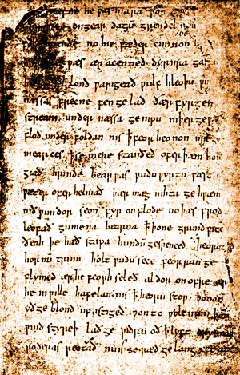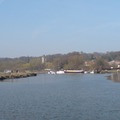Valahogy megint egy filmről írok, és mégse.
A Beowulf története egy középkori legendán, az első óangol írásos mítoszon alapul. A könyv i.sz. 700 és 1000 között íródott, szerzője ismeretlen, és egyetlen példányban maradt fel, amit a British Libraryban őriznek Londonban. A kézirat majdnem megsemmisült egy tűzben 1731-ben Sir Robert Cotton magánkönyvtárában. Az eposz Skandináviában játszódik, Beowulf Hroðgar király segítségére siet, mivel Grendel, Káin leszármazottja megállíthatatlanul gyilkolja az uralkodó alattvalóit és harcosait. Így az első nagy összecsapás kettőjük között zajlik, de a halandók fegyverei nem sérthetik meg Grendelt, akinek végül Beowulf letépi a karját. Grendelnek sikerül elmenekülnie, de később belehal sérüléseibe. Beowulf emberei valamint Hroðgar népe boldogan ünnepli Grendel legyőzését, amikor is Grendel anyja bosszúra szomjasan megjelenik, és megöli a király legkedvesebb harcosát. Beowulf csapata másnap a nő ellene indul. Beowulf és Mrs. Grendel csatája egy tóban zajlik, és majdnem végzetesnek bizonyul a főhős számára, mivel ellenfelét szintén nem tudja megsebezni fegyverével. A végén sikerül Grendel anyját az asszony saját kardjával lefejezni . Ezek után Beowulf visszatér saját országába, ahol királlyá koronázzák. Országában boldogság uralkodik egészen odáig, amíg egy szerencsétlen el nem rabolja a sárkány arany kupáját. Persze a sárkány erre ideges lesz, feléget mindent és mindenkit, aki csak a szeme elé kerül. Beowulf őt is sikeresen likvidálja, de nem éli túl a párbajt. A mítosz Beowulf temetéséval zárul.
A kézirat

Óangol (Beowulf halála):
worlde geweorces. Ðá sío wund ongon | in the world of action. Then the wound began, |
þé him se eorðdraca aér geworhte | which him the earth-dragon had caused earlier, |
swelan ond swellan· hé þæt sóna onfand· | to swelter and to swell; he soon discovered that, |
þæt him on bréostum bealoníð wéoll | it him in the breast welled with deadly evil, |
attor on innan. Ðá se æðeling gíong | poison inside. Then the noble went, |
þæt hé bí wealle wíshycgende | so that he by the wall wise in thought |
gesæt on sesse· seah on enta geweorc· | sat on a seat; he looked on the giants' work |
hú ðá stánbogan stapulum fæste | how the stone-arches on firm pillars |
éce eorðreced innan healden. | the eternal earth-hall supported within. |
Hyne þá mid handa heorodréorigne | Then with his hands, sword-bloody, |
þéoden maérne þegn ungemete till | the renowned chieftain, the immensely good thane |
winedryhten his wætere gelafede | his friend and lord washed with water, |
hilde sædne ond his helm onspéon· | weary of battle, and unfastened his helm; |
Bíowulf maþelode· hé ofer benne spræc, | Beowulf spoke; he spoke despite his injury, |
wunde wælbléate --wisse hé gearwe | the slaughter-wretched wound --he readily knew |
þæt hé dæghwíla gedrogen hæfde | that he the length of his days had fulfilled, |
eorðan wynne· ðá wæs eall sceacen | joy of earth; then was all departed |
dógorgerímes, déað ungemete néah--: | his number of days, death exceedingly near |
'Nú ic suna mínum syllan wolde | 'Now I to my son I would have wished to give |
gúðgewaédu þaér mé gifeðe swá | war-garments, if it had been granted to me such that |
aénig yrfeweard æfter wurde | any guardian of inheritance would be after |
líce gelenge· ic ðás léode héold | this body remaining; I ruled the people |
fíftig wintra· næs sé folccyning | fifty winters; there was not a folk-king |
ymbesittendra aénig ðára | of my neighbours --of any of them-- |
þé mec gúðwinum grétan dorste, | who me with war-friends dared to greet, |
egesan ðéön· ic on earde bád | to threaten with terror; I on earth awaited |
maélgesceafta· héold mín tela· | destiny, ruled my own well, |
ne sóhte searoníðas né mé swór fela | did not seek cunning hostility, nor swore me many |
áða on unriht· ic ðæs ealles mæg | oaths unjustly; I all of it can, |
feorhbennum séoc geféan habban | sick with mortal-injuries, have rejoicing, |
forðám mé wítan ne ðearf Waldend fíra | because he will not need to reproach me, the Ruler of men, |
morðorbealo mága þonne mín sceaceð | for dire murder of kin, when departs my |
líf of líce. Nú ðú lungre geong | life from body. Now go you quickly |
hord scéawian under hárne stán, | to examine the hoard under the hoary grey stone, |
Wígláf léofa, nú se wyrm ligeð, | dear Wiglaf, now the wyrm lies dead, |
swefeð sáre wund since beréafod | sleeping sorely wounded, deprived of treasure |
bío nú on ofoste þæt ic aérwelan | be now in haste, that I the ancient wealth, |
goldaéht ongite· gearo scéawige | the possession of gold might perceive, readily behold |
swegle searogimmas þæt ic ðý séft mæge | sparkling cleverly-cut gems, so that I can the more pleasantly |
æfter máððumwelan mín álaétan | for treasure-wealth leave my |
líf ond léodscipe þone ic longe héold.' | life and nation, that long I ruled.' |


